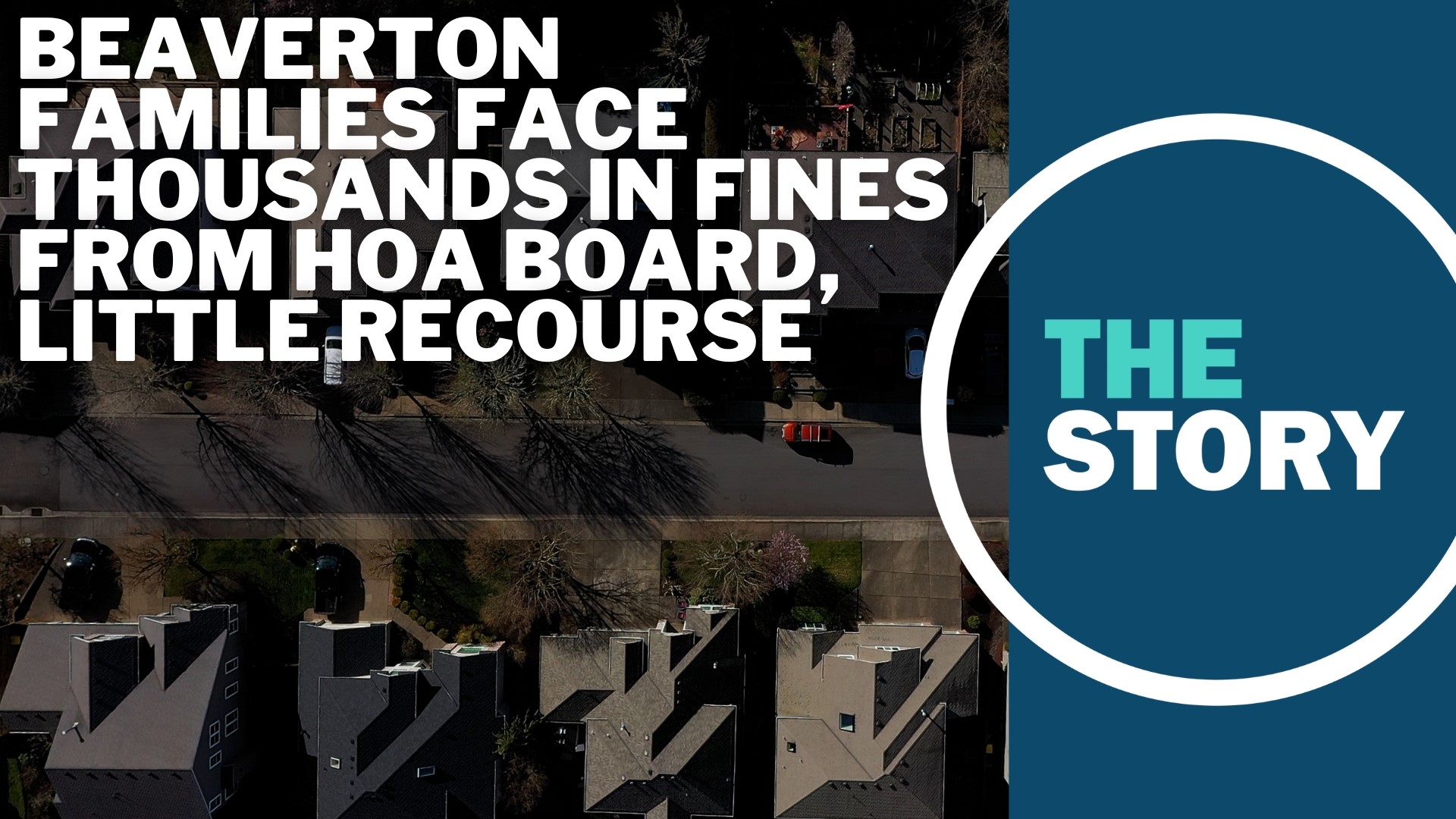BEAVERTON, Ore. — A group of Beaverton homeowners, facing thousands of dollars in fines from their neighborhood's HOA board, tried to remove their board president from his position — only for the board to change the neighborhood's bylaws the very next day, making it "essentially impossible" to be removed from power.
An attorney representing the HOA board told KGW that the homeowners' actions don't represent the entire community, as some people have been pleased with the 'clean-up' of the neighborhood, but the conflict highlights the delicate balance of power between neighborhoods and the associations that run them.
Homeowners associations, or HOAs, are mandatory neighborhood organizations that collect dues from homeowners to pay for things like landscaping and general maintenance. They set their own rules and punishment for violations, collecting dues and issuing fines — not too dissimilar from a local government agency.
However, as a private entity, HOAs lack the same level of accountability and oversight — which some residents are quickly finding out.
About 33 families live within the Cooper Mountain Estates HOA in Beaverton, south of Aloha, including Sam Sheikh and his wife, who have owned their suburban neighborhood home since 2008. They recently began renting it out to a retired military member and his family.

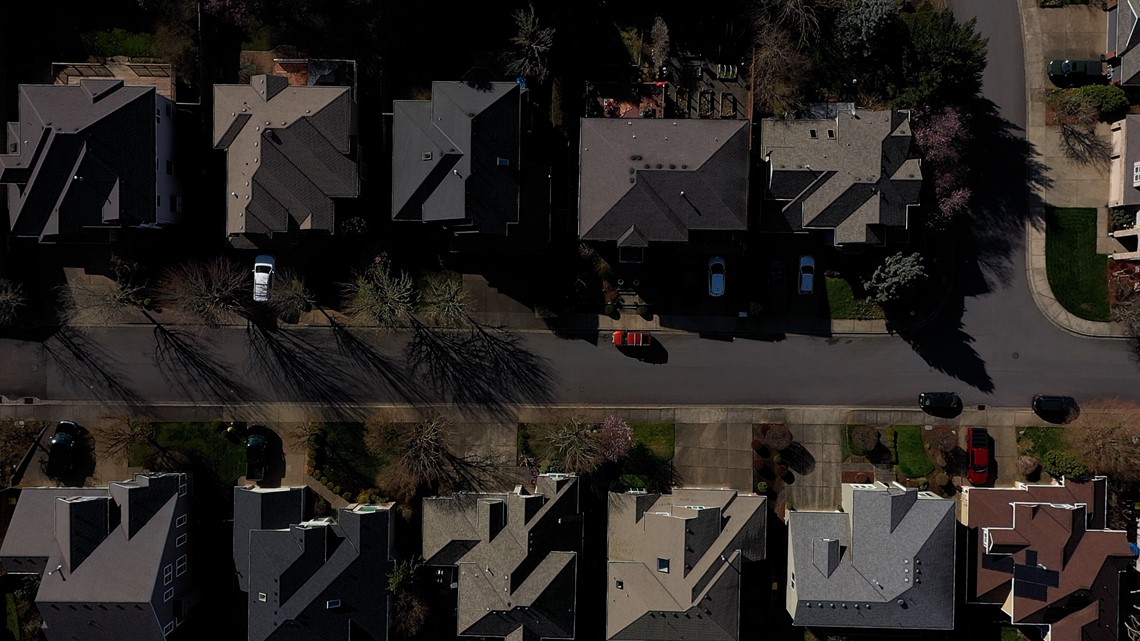
For 15 years, Sheikh said they had no problems with the neighborhood’s HOA, then last year, new neighbors took charge of the 3-person HOA board.
"Right now, we're looking at $10,150 (in fines), last time I checked, and it’s continuing to go up," he said.
It started in the garage. Sheikh’s tenant liked to do woodworking there.
In September, the HOA board sent Sheikh multiple violations and fines — up to $1,350 dollars a week — saying the tenant was operating a woodworking business, that he couldn’t fit two cars in the garage, and that woodworking was proof of "habitation" in the garage — all HOA violations.
"We said, 'This is not habitation; this is occasional. This is a wood-working hobby. We don't believe that we're in any violation,'" Sheikh said.
Sheikh said he was also fined for a dead patch of grass, which they had covered with stone pavers after checking with the prior board.
And then, the HOA board issued fines for who was living in the neighborhood.
KGW talked with multiple families who were penalized for having older family members, like parents-in-law, living with them. The HOA board fined families $300 per week for using their homes as "multi-family dwellings."
“The board asked for specifics — names, cars, license plates, all personal details from every person in there, and you can imagine it was kind of humiliating, but we didn't want to get fined," Sheikh said.

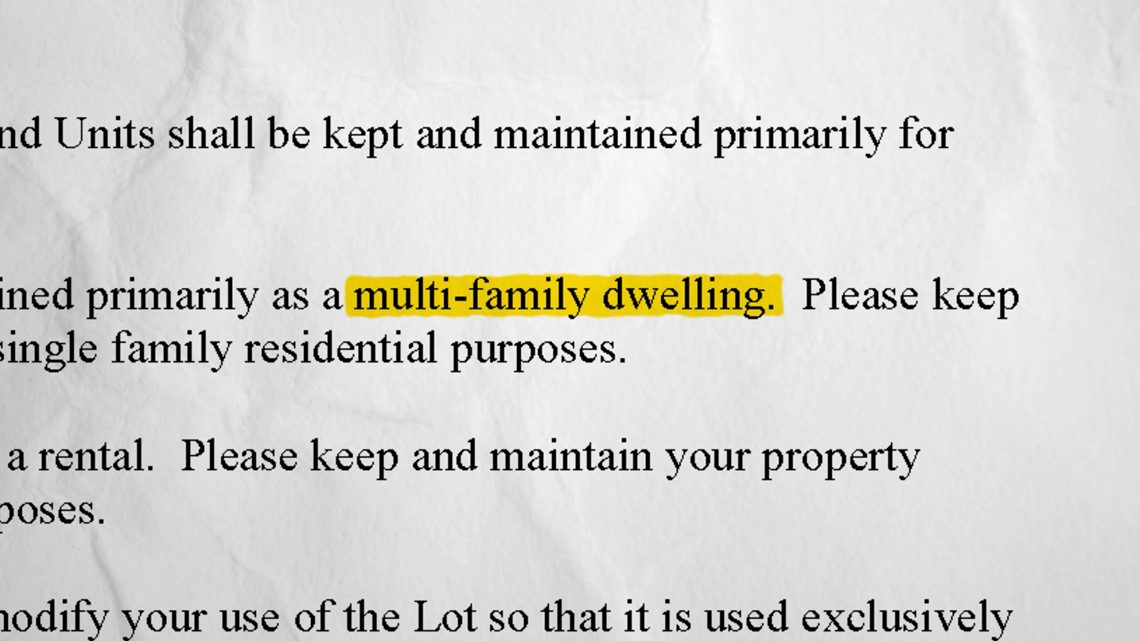
Some residents told KGW they moved out of the neighborhood because of these fines and other board decisions. Others asked for their interviews not to be shown on camera because they’re trying to get their fines reduced or removed and are worried about retaliation.
For Sheikh, the violations seemed petty and personal.
"We felt targeted, as other families have felt as well, and certainly, the tenant felt targeted," he said. "I felt that everything we did wouldn't be satisfactory, and this was proved true."
On October 17, a group of frustrated homeowners sent the HOA board a letter requesting a special meeting. They said they wanted to vote to remove board’s president, and per the HOA bylaws, they represented more than 25% of the outstanding vote needed to do so.
The very next day, board president Martin Anderson called a special meeting of his own.
According to board meeting minutes from October 18, Anderson and one other board member voted to change the bylaws, adopting an amendment that would "change the percentage of owners who could call a special meeting of the owners to 50%" and "change the percentage of owners necessary to establish a quorum at meetings of the owners to 90%."

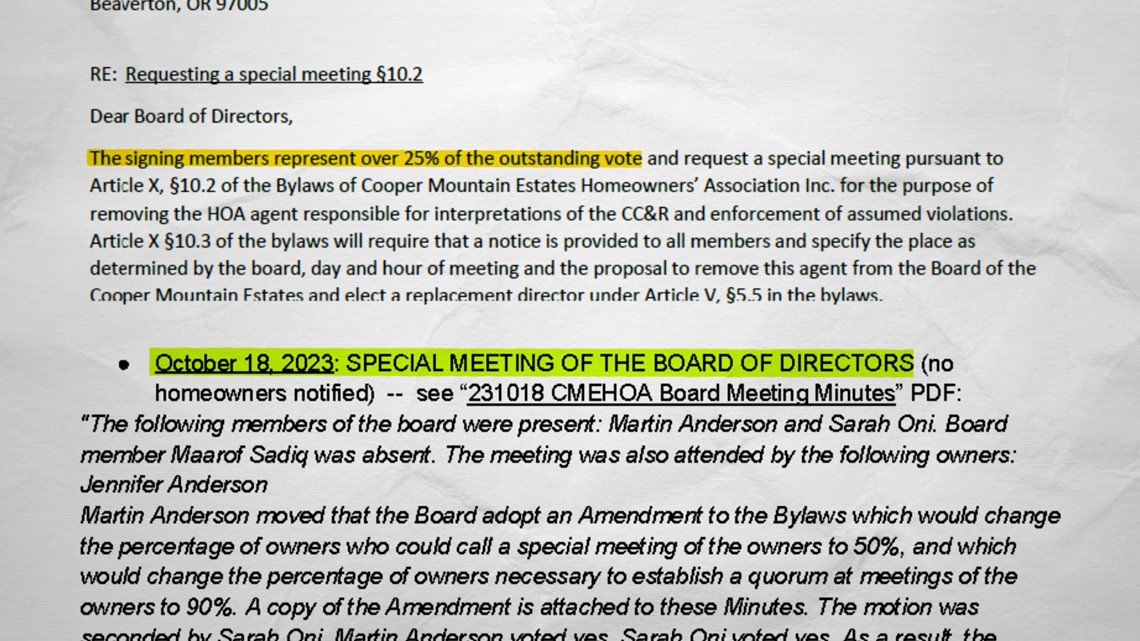
Per the minutes, Anderson then rejected the homeowners' request for a special meeting for not complying with the prior bylaws.
Sheikh told KGW this was because the homeowners had not physically signed the document calling for a special meeting, and by the time they could rectify that, the new bylaws were in place, making recall "essentially impossible."
"When homeowners found out that the thresholds had been changed without notice to us, we were all shocked," he said.
In early March, KGW talked with HOA president Martin Anderson on the phone, requesting an interview so he could explain his perspective. Anderson explained that the new board wanted to crack down on late dues and costs, such as paying too much for landscaping, and that he felt the neighborhood had gone downhill in recent years.
However, Anderson did not agree to an on-camera interview that day, and since then has not responded to KGW's messages.
A letter from the Cooper Mountain Estates HOA Board of Directors to homeowners from September 17 detailed some of the board's thinking: The board had fired the previous management company, adopted new enforcement and fine standards, started investigating its community maintenance obligations, and requested homeowners to pay any late dues and send photos of violations around the neighborhood to the board.
Chris Tingey, an attorney representing the Cooper Mountain Estates HOA Board, did talk with KGW about a week after this article was initially published. Tingey said the neighborhood's rules were designed by the developer years ago and that there is community support for the board's actions.
"The story at Cooper Mountain told one side of the story, it didn't tell the other side of all the people that wanted to clean up the condition of the property," Tingey said. "They have narrow roads, for example, and so the parking issue is we need to get cars off the streets and we need to get them in garages and in driveways so that it's safe and habitable ... covenants create these responsibilities, they create these restrictions to allow property values to maintain and go up."
In November, a few weeks after the change to the bylaws, Sam Sheikh received two more fines, saying his tenant was "observed from the street performing work on their truck" — a violation of "dismantling or assembling motor vehicles" in an area that's not "screened from view."
The other violation said "the garage is being used for performing repairs on an automobile (which involves habitation of the garage by a person while the repairs are being performed.)"
“It's endless trying to chase these things, exhausting," Sheikh said. "It has really affected the quality of our lives."

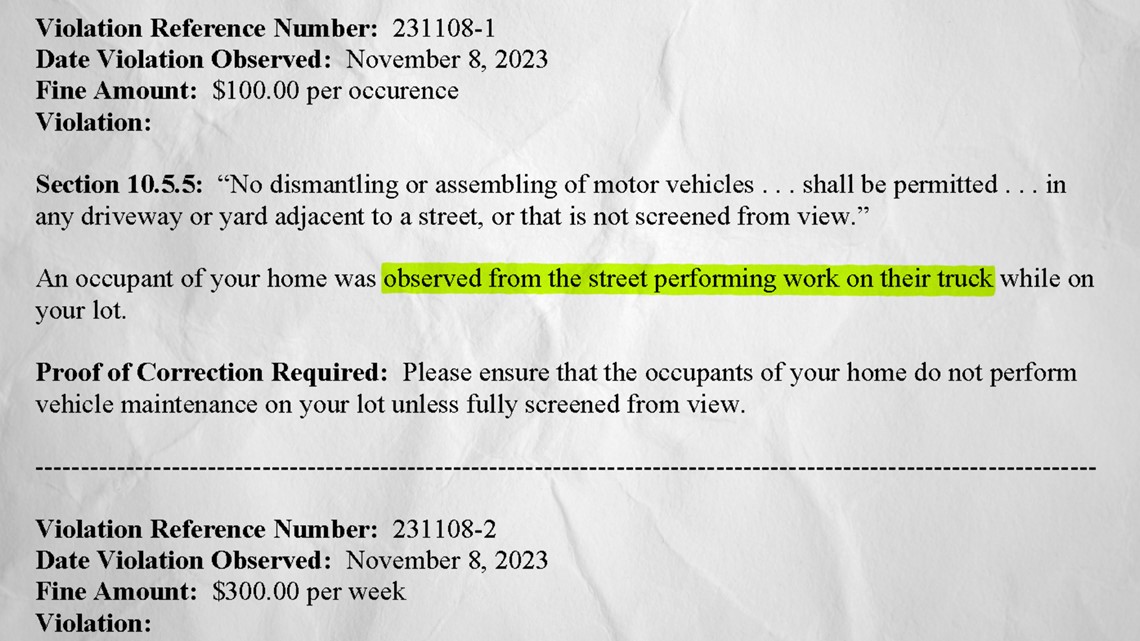
After this round of violations, Sheikh’s tenants decided to move out, writing in a message that was later shared with the board: "The harassment of the HOA has made us feel very uncomfortable and has forced us to look for a new place to live ... these claims are outrageous, and the discrimination is appalling."
Sheikh said it was clear to him there's a lack of oversight for HOAs.
"Boy, this just screams of abuse, right? Or it suggests that this entire system in the wrong hands, with the wrong people serving these positions for the wrong reason, could damage a community," Sheikh said.
HOAs are largely unregulated, and as private organizations, the government sees any disputes as private matters.
Kevin Harker, an attorney with Harker Lepore who specializes in HOA law, said most HOA board members are volunteers trying their best to help their community.
"The way I view the directors' role is to preserve property values and preserve the aesthetics of the community," Harker said.
When there is conflict between board members and homeowners, Harker explained, government agencies don’t have the legal authority to get involved. Ultimately, a civil lawsuit is the last recourse.
"If the government had to get involved in enforcing these, that’s all they would do," he said. "Our firm alone deals with dispute after dispute, and frankly, when you can’t resolve it, ultimately, a judge does. Litigation is expensive though; it’s emotional and it can hold up sales in the community."
Both Washington County and the City of Beaverton declined on-camera interviews to explain why government agencies would not be able to intervene or provide oversight in matters such as this one, barring a significant risk to public safety.
Harker recommends that homeowners pay close attention to their HOA's codes and regulations, volunteer on the board and track board finances, and do anything possible to resolve disputes amicably.
"When you choose to move into one of these, you're giving up some rights and agreeing to do some things," Harker said. "If you've got to go through litigation with your neighbor, you'll never be civil or friends again, so if there's a way to resolve it through mediation, I'm a huge advocate of that."
Helen Leek, a realtor with 36 years of experience who has been president of her neighborhood's HOA, told KGW after the initial airing of this story that she had never read HOA bylaws that gave so much power to board members at the expense of homeowners.
"Their bylaws were just so rigid and gave homeowners very little latitude to do anything about the board of directors," she said. "Deeply weighted to dictatorial as opposed to community grassroots."
Leek added that she believes the Cooper Mountain case is not representative of most HOAs, which she believes can be very positive for a neighborhood if run well with community involvement.
"A home is one of the biggest investments someone is going to make, you want to guard that and you want to keep the community looking good and the yards in good shape and broken-down vehicles not parked on the street, that's what an HOA does for you," Leek said.
Across the country, it’s increasingly common that new homeowners will buy an HOA-governed property.
The U.S. Census Bureau reports that 84% of new, single-family homes sold in 2022 belonged to HOAs.
Sheikh said he feels that his situation is a warning sign.
"We simply don't know who to turn to other than going to a lawyer to help us defend ourselves," he said. "I thought we were a community, and now, it's become us versus them."

